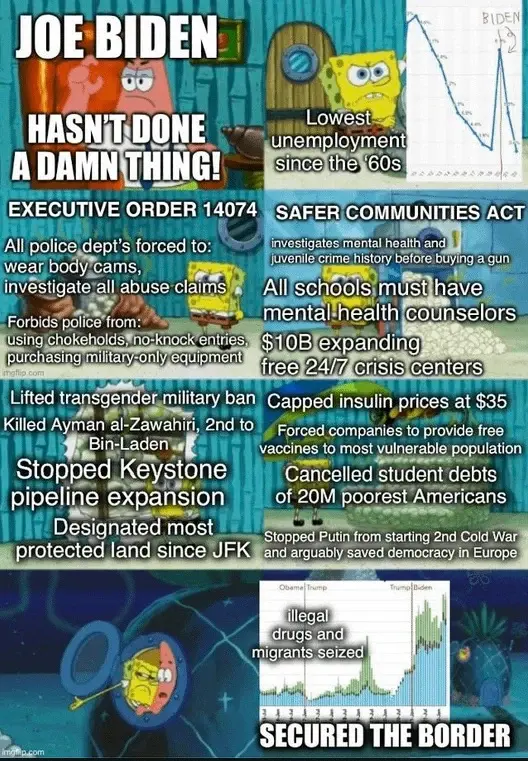this post was submitted on 18 Jan 2024
1039 points (83.2% liked)
Political Memes
5604 readers
1062 users here now
Welcome to politcal memes!
These are our rules:
Be civil
Jokes are okay, but don’t intentionally harass or disturb any member of our community. Sexism, racism and bigotry are not allowed. Good faith argumentation only. No posts discouraging people to vote or shaming people for voting.
No misinformation
Don’t post any intentional misinformation. When asked by mods, provide sources for any claims you make.
Posts should be memes
Random pictures do not qualify as memes. Relevance to politics is required.
No bots, spam or self-promotion
Follow instance rules, ask for your bot to be allowed on this community.
founded 2 years ago
MODERATORS
you are viewing a single comment's thread
view the rest of the comments
view the rest of the comments

Unemployment is a meaningless statistic due to the weird definition. The more useful statistic is #of jobs divided by total population, which peaked in 1970 and has been declining fairly consistently ever since
That's like claiming you have more bread by cutting the slices thinner.
Unemployment stats are typically useless for other reasons. For example, this is the definition of unemployed.
https://www.bls.gov/cps/definitions.htm#unemployed
In the Current Population Survey, people are classified as unemployed if they meet all of the following criteria:
Done an hour of DoorDash or whatever? Homeless? Not unemployed. It's very much a meaningless stat and governments around the world game it all the time.
Not that I disagree with you, but if you counted all people who didn't have a job then you'd skew the statistic even more by counting voluntary stay at home parents and other people who don't work because they don't need to.
Can you come up with a criteria that accounts for those who don't have a job because the system prevents their access to the market without counting voluntary unemployment?
Why is this important? Number of people with jobs / number of people is a statistic that obviously shouldn't be 100%, but if it goes up or down that's something we should pay attention to. If we suddenly have a large spike in people who stay at home and don't work, we should at least understand why
Not one that would be completely accurate.
The best I've seen was a measure of underemployment, in which somebody wants more money/better work, is actively looking, but can't get it. It would have to be through random surveys and extrapolate up, rather than something they can get from the benefits office.
Except this doesn't capture it really, either, since the number of people with multiple jobs has been increasing steadily
Oh yeah maybe the statistic I was thinking of was percent of population that has a job